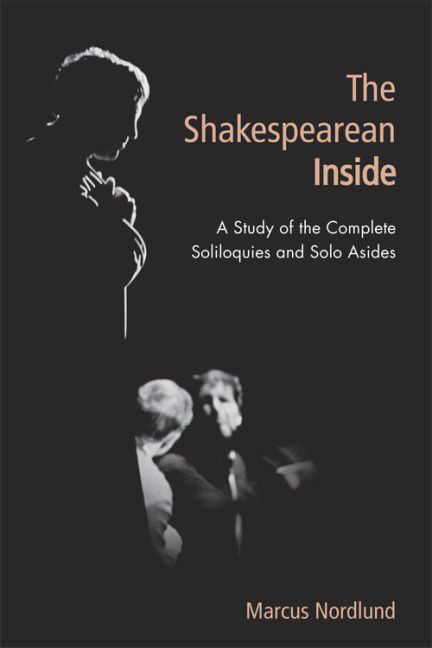2 - Divergence
Published online by Cambridge University Press: 08 August 2017
Summary
A speech which is not spoken on an empty stage may yet be nearer to soliloquy than dialogue.
M. C. BradbrookChapter 1 explored an important question about Shakespeare's insides: the problem of their direction. I argued for a softer version of James Hirsh's argument for the dominance of self-address in the delivery of asides and soliloquies which allowed for principled variations in Shakespeare's dramatic practice. On the first page of that chapter I also raised a second question that has so far gone unanswered:
Can we always know if a Shakespearean actor or character intends to address another character? Will there not be hybrids and borderline cases?
A canon as vast as Shakespeare's is likely to contain many ambiguous speeches, some of which will disturb the modern researcher's attempt at quantification, and some of which may even have been written with the direct intent of being ambiguous. This chapter will explore some situations and conditions where speech becomes difficult to categorise on the internal level of the dramatic fiction, with a focus on those instances where this lack of clarity becomes particularly productive.
The central problem here is how to decode the putative intentions of fictional beings that do not exist independently from the text. At first sight, this looks like the sort of nightmares suffered by the orthodox psychological behaviourists of the twentieth century. If even real human minds are impenetrable black boxes, then how can we possibly hope to gaze into the mind of someone who does not even exist? The analogy between psychological and textual interpretation is instructive, for in both cases the question revolves around our limited capacity to pierce beneath a visible surface and uncover underlying structures, motivations, or intentions.
Traditional behaviourism is now seriously out of date as a psychological theory because its super-strict concern with observed, measurable behaviour not only bracketed but actively suppressed so many important questions from the scientific discourse about the mind.
Information
- Type
- Chapter
- Information
- The Shakespearean InsideA Study of the Complete Soliloquies and Solo Asides, pp. 61 - 106Publisher: Edinburgh University PressPrint publication year: 2017
